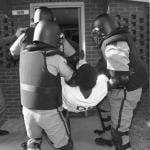John Calvin was totally depraved. Everything that man said and did was indelibly and inextricably tainted by sin. Everything he thought and taught was deformed and misshapen because of sin. That sin affected and altered every aspect of his life and faith and teaching and religion.
 Some people would read the above as a harsh critique of John Calvin. Quite a few self-described “Calvinists” would object to that paragraph as some kind of vicious attack on their theological hero. But you know who would agree with every word of that, wholeheartedly? John Calvin.
Some people would read the above as a harsh critique of John Calvin. Quite a few self-described “Calvinists” would object to that paragraph as some kind of vicious attack on their theological hero. But you know who would agree with every word of that, wholeheartedly? John Calvin.
His only objection to anything above would be with the use of that word “wholeheartedly.” Total depravity means that we’re not capable of doing anything 100% whole-heartedly.
I have enormous objections to a great deal of Calvin’s theology, much of which strikes me as not just wrong, but blasphemous. But “total depravity” is not among those objections. It’s a useful, rich insight into human nature, one that is both descriptively accurate and predictively useful.
Alas, this bit of Calvinist/Reformed theology is widely misunderstood. “Total depravity” is treated as an assertion of superlative depravity, like it’s accusing everyone of being Caligula or something.
But that’s not the idea here. “Total depravity” is not an assertion that we’re as bad as we could possibly be, it’s the belief that our badness is intrinsic and pervasive, affecting the totality of who we are. We are not purely good spirits trapped in evil flesh, or purely good hearts with bad brains, or purely good brains with bad hearts. We can’t blame a single defective aspect — our will or our intellect or our genitalia, etc. — for our inevitable self-centeredness, pride, greed, neglect, contempt, etc. Nor can we isolate and exonerate any other aspect of ourselves as pure and innocent and untouched by that same sinful selfishness and pride.
I am not trying here to persuade you to embrace Reformed theology’s concept of “total depravity” and “original sin.” I’m just trying to describe it for you and to point out that this is a widely held bit of basic doctrine for American Protestants for whom none of this is new or complicated or controversial. If this post were a sermon in an American white evangelical church, this is where I’d start to quote chapter-and-verse — “All of our righteous acts are like filthy rags” and “There is no one righteous, not even one,” etc.
This is, simply, mainstream Protestant doctrine and a basic core of what white evangelicals believe.
Until you start talking about American history. Total depravity does not apply to American history. Nothing of what Reformed white evangelicals believe about human nature is allowed to be applied to American history.
Once the subject is American history, you will no longer get “Amens” from white evangelicals for quoting from the book of Romans or Isaiah, and you’ll be loudly denounced if you bring up total depravity or any of the other basic beliefs that Reformed theology holds about human nature. Instead, what they desperately want to hear is something like this, from Matt Bai in a Bezos Post op-ed titled “Is Trump right about the Smithsonian?“:
There is a strain of American leftism — I refuse to call it liberal or progressive — that has long viewed the country’s history as little more than a dark amalgam of grievances. To the academic left, in particular, injustice isn’t so much an ugly aspect of the American experience as it is the country’s main reason for being.
This once-marginalized view of Americanism is at the core of the New York Times’s “1619 Project,” which became a curriculum resource for U.S. schools and a flash point in arguments over identity and history.
Cut through the oleaginous smarm there and you’ll see that his self-flattering caricature of “the academic left” is really just an attack on bog-standard, orthodox Reformed theology. It’s his attempt to defend against anyone who dares to suggest that we humans are fallen, fallible, finite creatures whose very best efforts and achievements are still inevitably tainted by sin.
All of the bogey men and scary monsters of Bai’s imagination here — “leftism,” “critical race theory,” any hint that 1619 is a significant date in American history — are rejected because they are congruent with the humble, chastened, pessimistic understanding of human nature taught and affirmed as doctrine in nearly every white evangelical and white Protestant church. Bai imagines that he’s positioning himself as a reasonable centrist and Serious Person because he’s rejecting “critical race theory,” but what he’s actually rejecting is total depravity and original sin.
His argument is not with the 1619 Project or with Ibram X. Kendi or with whichever other Black academic white “centrist” posers are fretting about this week. His argument is with Calvin and Augustine and Paul.
And he’s losing that argument, not because their understanding of human nature is more “orthodox” than his, but because their description of human nature is more accurate. As demonstrated by, for example, American history.
This is my great frustration with the white evangelical response to the excellent work in American history recently produced by Jemar Tisby and Kristin Du Mez. Both of them approach history — and everything, really — from an explicitly Reformed perspective. Tisby graduated from Reformed Theological Seminary and Du Mez is a professor at Calvin. But these are not just institutional affiliations — this is how they view the world. And both of them have applied the insights of Reformed theology to improve and increase our understanding of the way that pervasive, inevitable sin and injustice — total depravity — taints and misshapes our history and our present.
This has produced a backlash from smarmy “centrists” who try to disparage their work as “a dark amalgam of grievances.” But it’s not that at all. It’s just Calvinism 101 — just very, very basic applied Reformed theology.
What does “total depravity” mean? It means you cannot begin to understand human behavior or human history without attempting to discern the effects of pervasive, pernicious injustice and sin tangling and twisting all of it at every step.











